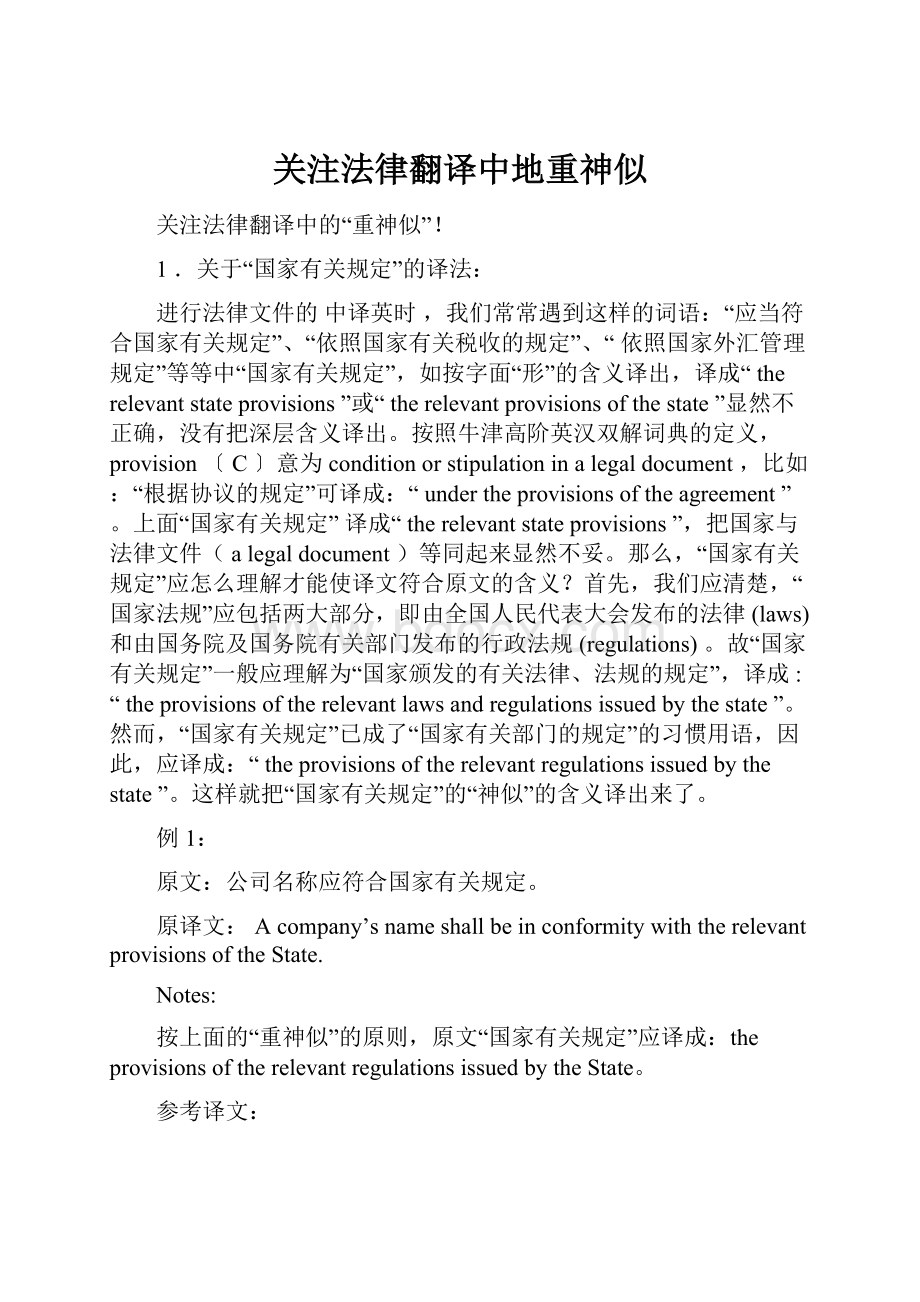关注法律翻译中地重神似.docx
《关注法律翻译中地重神似.docx》由会员分享,可在线阅读,更多相关《关注法律翻译中地重神似.docx(17页珍藏版)》请在冰豆网上搜索。

关注法律翻译中地重神似
关注法律翻译中的“重神似”!
1.关于“国家有关规定”的译法:
进行法律文件的中译英时,我们常常遇到这样的词语:
“应当符合国家有关规定”、“依照国家有关税收的规定”、“依照国家外汇管理规定”等等中“国家有关规定”,如按字面“形”的含义译出,译成“therelevantstateprovisions”或“therelevantprovisionsofthestate”显然不正确,没有把深层含义译出。
按照牛津高阶英汉双解词典的定义,provision〔C〕意为conditionorstipulationinalegaldocument,比如:
“根据协议的规定”可译成:
“undertheprovisionsoftheagreement”。
上面“国家有关规定”译成“therelevantstateprovisions”,把国家与法律文件(alegaldocument)等同起来显然不妥。
那么,“国家有关规定”应怎么理解才能使译文符合原文的含义?
首先,我们应清楚,“国家法规”应包括两大部分,即由全国人民代表大会发布的法律(laws)和由国务院及国务院有关部门发布的行政法规(regulations)。
故“国家有关规定”一般应理解为“国家颁发的有关法律、法规的规定”,译成:
“theprovisionsoftherelevantlawsandregulationsissuedbythestate”。
然而,“国家有关规定”已成了“国家有关部门的规定”的习惯用语,因此,应译成:
“theprovisionsoftherelevantregulationsissuedbythestate”。
这样就把“国家有关规定”的“神似”的含义译出来了。
例1:
原文:
公司名称应符合国家有关规定。
原译文:
Acompany’snameshallbeinconformitywiththerelevantprovisionsoftheState.
Notes:
按上面的“重神似”的原则,原文“国家有关规定”应译成:
theprovisionsoftherelevantregulationsissuedbytheState。
参考译文:
Acompany’snameshallbeinconformitywiththeprovisionsoftherelevantregulationsissuedbytheState.。
例2:
原文:
“外资企业依照国家有关税收的规定纳税并可以享受减税、免税的优惠待遇。
”
原译文:
“Enterpriseswithforeigncapitalshallpaytaxesinaccordancewithrelevantstateprovisionsfortaxpayment,andmayenjoypreferentialtreatmentforreductionoforexemptionfromtaxes.”
Notes:
除上面提及的“国家有关规定”译法外,句子的结构也应调整。
参考译文:
Enterpriseswithforeigncapitalshall,inaccordancewiththeprovisionsoftherelevantregulationsissuedbytheStateontaxpayment,paytaxesandmayenjoypreferentialtreatmentforreductionoforexemptionfromtaxes.
例3:
原文:
“外国公司在中华人民共和国境内设立的分支机构的登记,按照国务院的有关规定办理。
”
原译文:
“TheregistrationofabranchassubsidiarysetupbyaforeigncompanywithintheterritoryofthePeople’sRepublicofChinashallbeconductedinaccordancewiththerelevantprovisionsoftheStateCouncil.”
Notes:
1)公司的分支机构有两类,一是分公司(branch),二是子公司(subsidiary),原文中的“分支机构”是泛指,应理解为包括分公司和子公司,应译成abranchorasubsidiary。
2)原文中的“按照国务院的有关规定办理”不能简单译成“inaccordancewiththerelevantprovisionsoftheStateCouncil”,这样译法只能定位“重形似”,这里需要对原文进行深层的理解,应理解为“按照国务院有关行政法规的规定办理”,按照我国的法律制度,法律由全国人民代表大会颁发,国务院负责制定行政法规,我们所说的国务院的有关规定,实际上是指“国务院制定颁发的有关行政法规的规定,”因此应译成:
“inaccordancewiththeprovisionsoftherelevantadministrationregulationsissuedbytheStateCouncil.”
参考译文:
TheregistrationofabranchorasubsidiarysetupbyaforeigncompanywithintheterritoryofthePeople’sRepublicofChinashallbeconductedinaccordancewiththeprovisionsoftherelevantadministrationregulationsissuedbytheStateCouncil
2.关于“依法”的译法:
中文法律文件中“依法”与“有关法律法规”中“法律”不一样。
“有关法律法规”中“法律”,是指具体的某部法律,这里的英文law是可数名词,因此要译成therelevantlawsandregulations。
而“依法”是指“依照法律”之意,是指整体法的泛指,应译成inaccordancewithlaw,也可译成inaccordancewiththelaw,这里的law是不可数名词,意为bodyofsuchrules即(整体的)法,法律。
下列各例中的“依法”都为不可数名词。
例1:
原文:
对外贸易经营者依法自主经营、自负盈亏。
参考译文:
Foreigntradedealersshall,inaccordancewiththelaw,enjoyfullautonomyintheirbusinessoperationandberesponsiblefortheirownprofitsandlosses.
例2:
原文:
国务院外汇管理部门及其分支机构(以下统称外汇管理机关),依法履行外汇管理职责,负责本条例的实施。
参考译文:
TheforeignexchangecontroldepartmentundertheStateCouncilandthebranchesthereof(hereinafterreferredtoasforeignexchangecontrolorgans)shall,inaccordancewithlaw,perform.thefunctionsofforeignexchangecontrolandberesponsiblefortheimplementationoftheseRegulations.
例3:
原文:
WhenevertheUnitedStatesgovernmentoranyofficeroragencythereofshallprovidepensionsorotheraidfortheaged,cooperationbytheStatetherewithandthereinisherebyauthorizedinsuchmannerandtosuchextentasmaybeprovidedbylaw.
Notes:
1)原文“anyofficeroragencythereof”应译成“任何政府官员或政府机构”,thereof是法律英语用词,意为“oftheUnitedStatesgovernment”。
2)原文“therewithandtherein”是法律英语用词,分别意为“withtheUnitedStatesgovernmentoranyofficeroragencythereof”和“inprovidingpensionsorotheraidfortheaged”。
因此,原文“cooperationbytheStatetherewithandtherein”应译成:
“本州协助联邦政府、政府官员或政府机构提供的上述养老金或其它帮助”
3)原文“hereby”是英语法律条款中常用的副词,意为:
“特此,因此,兹”。
4)原文“bylaw.”,文中的“bylaw”是“依法”、“按照法律”之意,是不可数名词。
参考译文:
无论何时美国联邦政府或任何政府官员或政府机构应向老年人提供养老金或其它帮助,本州协助联邦政府、政府官员或政府机构提供的上述养老金或其它帮助,按照法律可能规定的方式和程度,应特此予以授权。
3.关于“一方,另一方”的译法:
“一方,另一方”在法律、合同文件经常出现的用语,其中“一方”是指“当事人一方”、“当事人中的任何一方”之意。
在中译英时,不能按字面翻译,译成oneparty或oneoftheParties,从英文字的含义来说oneparty是指aparticularparty之意,是确指,而either,按牛津高级词典解释,是指两者之一。
在法律条文中的“一方”往往是指“当事人中的任何一方”,应当译成eitherparty或eitheroftheparties。
下例各句中“一方”都是“当事人中的任何一方”之意。
例1:
原文:
当事人达成仲裁协议,一方向人民法院起诉的,人民法院不予受理,但仲裁协议无效的除外。
Notes:
原文中的“一方”,根据本条文含义,“一方向人民法院起诉的,”是指“达成仲裁协议当事人中的任何一方”,而决不是指“向人民法院起诉的一方”是确定的。
因此这里的“一方”不译成oneparty或oneoftheParties,应当译成eitherparty或eitheroftheparties。
参考译文:
Apeople’scourtshallnotacceptanactioninitiatedbyeitherofthepartiesifthePartieshaveconcludedandenteredintoanarbitrationagreement,unlessthearbitrationagreementisinvalid.
例2:
原文:
当事人一方违约后,对方应当采取适当措施防止损失的扩大;没有采取适当措施致使损失扩大的,不得就扩大的损失要求赔偿。
参考译文:
Aftereitherpartyviolatesacontract,theotherpartyshalltakepropermeasurestopreventtheincreaseofthelosses.Providedthatwheretheotherpartyfailstotakepropermeasuressothatthelossesareincreased,thepartyinquestionshallnotclaimanycompensationinrelationtotheincreasedlosses.
例3:
原文:
当事人一方不履行合同义务或者履行合同义务不符合约定,给对方造成损失的,损失赔偿额应当相当于因违约所造成的损失,包括合同履行后可以获得的利益,但不得超过违反合同一方订立合同时预见到或者应当预见到的因违反合同可能造成的损失。
参考译文:
Whereeitherpartytoacontractfailstoperform.thecontractobligationsoritsperformancefailstosatisfytherequirementsandprovisionsofthecontractandcauseslosstotheotherparty,theamountofcompensationforlossesshallbeequaltothelossescausedbythebreachofcontract,includingtheobtainablegainsaftertheperformanceofthecontract,providedthattheamountofcompensationshallnotexceedsuchprobableforeseenlossescausedbythebreachofcontractashasbeenforeseenorasshallbeforeseenwhenthebreachingpartyconcludesthecontract.
4.关于“中央储备粮”的译法:
“中央储备粮”意为“中央人民政府的储备粮”,应译成:
grainreservesofthecentralpeople’sgovernment,而不能按字面意思译成:
thecentralgrainreserves。
按照牛津英文词典的字义解释,central:
(1)意为“of,at,nearorformingthecentreofsth”(中央的,在中心的,形成中心的)。
例如,WeliveincentralLondon.(我们住在倫敦中部);Ourhouseisverycentral,i.e.isinorclosetothecentreofthetown.)(我们的房子就在市中心)。
(2)意为havingoverallpowerorcontrol(有全部权力或控制力的)。
例如,centralgovernment,i.e.thegovernmentofthewholecountry,ascontractedwiththelocalgovernment.(中央政府,即区别于地方政府)。
以上可见“中央储备粮”,既不是“处于中心的储备粮”,也不可能是“有全部权力或控制力的储备粮”,而是“中央人民政府的储备粮”,应译成:
grainreservesofthecentralpeople’sgovernment。
请看以下例子:
例1:
原文:
为了加强对中央储备粮的管理,保证中央储备粮数量真实、质量良好和储存安全,保护农民利益,维护粮食市场稳定,有效发挥中央储备粮在国家宏观调控中的作用,制定本条例。
参考译文:
TheseRegulationsareformulatedandenactedinordertostrengthentheadministrationofgrainreservesofthecentralpeople’sgovernment,ensuretheirauthenticquantity,highqualityandsafestorageofthereservesinquestion,safeguardfarmers’interests,maintainthestabilityofthegrainmarket,andplaytheeffectiveroleofgrainreservesofthecentralpeople’sgovernmentintheStatemacro-controlsystem.
5.关于“技术规范”的译法:
所谓“技术规范”是指对建造某一项目的技术要求和范围,规定了所用材料的质量和工艺标准,应译成technicalspecifications,而不应译成technicalnorms。
按照牛津英文词典的字义解释,specifications意为detailsandinstructionsdescribingthedesign,materials,etcofsthtobemadeordone(规格;规格说明)。
例如,specificationsforbuildingagarage(建造车库的规格说明);thetechnicalspecificationsofanewcar(新汽车的技术规范)。
而norms则意为standardorpatternthatistypical(ofagroup,etc),Youmustadapttothenormsofthesocietyyoulivein.(在社会中生活就要遵循社会行为准则。
)
以上可见specifications主要用于技术上的要求,标准和规范,而norms主要用于行为准则,规范。
下面各例都是指技术规范,都用specifications。
例1:
原文:
中国储备粮管理总公司直属企业、中央储备粮代储企业(以下统称承储企业)储存中央储备粮,应当严格执行国家有关中央储备粮管理的行政法规、规章、国家标准和技术规范,以及中国储备粮管理总公司依照有关行政法规、规章、国家标准和技术规范制定的各项业务管理制度。
参考译文:
TheenterprisesdirectlysubordinatedtotheChinaGrainReservesCorporationandtheenterprisesentrustedwiththestorageofgrainreservesofthecentralpeople’sgovernment(hereinaftercollectivelyreferredtoasthestoringenterprises)shall,inthestorageofgrainreservesofthecentralpeople’sgovernment,strictlycomplywiththeadministrativeregulations,rules,nationalstandardsandtechnicalspecificationsontheadministrationofgrainreservesofthecentralpeople’sgovernment,andwiththevariousbusinessmanagementsystemsformulatedbytheChinaGrainReservesCorporationinaccordancewiththerelevantadministrativeregulations,rules,nationalstandardsandtechnicalspecifications.
例2:
原文:
“Specification”meansthespecificationoftheWorksincludedintheContractandanymodificationthereoforadditiontheretounderClause51orsubmittedbytheContractorandapprovedbytheEngineer.
参考译文:
“规范”是指合同规定的工程规范,以及任何根据第51条或由承包人提出并经工程师批准的对规范的修改或增补。
6.关于“但、但是”的译法:
法律条文中的“但、但是”不能按不字面意思,译成but,这种译法意思并不准确。
按“重神似”的原则,应把“但、但是”内在含义译出。
法律条文往往在同一个条文中对某事作了规定后,需要作进一步规定时,在语气上常常用“但是”“但”等词表转折,然而,法律条文中的“但是”“但”,并不是我们平常意义中的“但是”,是法律上的“进一步规定”之意,法律英语中,我们常用providedthat,providedalsothat,providedhoweverthat或providedfurtherthat来表示。
在美国的法律文件中通常在provided和that之间用逗号逗开,写成:
provided,that;provided,also,that;provided,however,that或provided,further,that来表示,这些词组都表示“但规定”,“进一步规定”“但是”等意。
例1:
原文:
受要约人在承诺期限内发出承诺,按照通常情形能够及时到达要约人,但因其他原因承诺到达要约人时超过承诺期的,除要约人及时通知受要约人因承诺超过期限不接受该承诺的以外,该承诺有效。
原译文:
Iftheoffereedispatchestheacceptancewithinthetimelimitforacceptancewhichcanreachtheofferorinduetimeundernormalcircumstance,buttheacceptancereachestheofferorbeyondthetimelimitbecauseofotherreasons,theacceptanceshallbeeffective,exceptthat,theofferorinformstheoffereepromptlythatitdoesnota